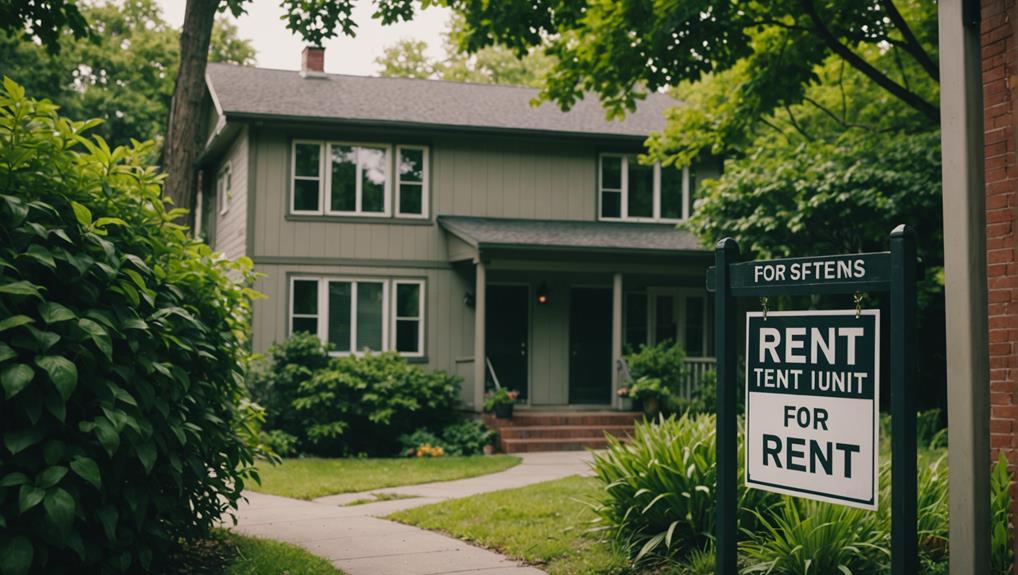Embarking on a real estate investment journey without substantial capital might seem daunting, but numerous strategies mitigate financial barriers. Leveraging Real Estate Investment Trusts (REITs) and Real Estate Crowdfunding are effective ways to start.
More hands-on approaches like House Hacking and Wholesaling Properties also offer viable entry points. Creative financing methods such as Seller Financing and Lease Options present additional pathways.
Exploring options like Microloans, Partnering with Experienced Investors, and utilizing Local Grants and Assistance Programs can also prove beneficial.
Are you curious to learn how these strategies can be effectively employed?
Key Insights
- Invest in REITs to gain diverse property exposure with minimal upfront capital.
- Start investing with low initial outlays through real estate crowdfunding.
- Offset mortgage costs by renting out parts of your primary residence, a method known as house hacking.
- Control properties with minimal initial expenditure using lease options, which also offer the potential for future purchase.
- Secure flexible financing with competitive interest rates through microloans or peer-to-peer lending.
Real Estate Investment Trusts (REITs)

Real Estate Investment Trusts (REITs) provide a practical and accessible way for investors to enter the real estate market with minimal upfront capital. By purchasing shares in REITs, investors gain ownership in companies that manage and operate diverse property portfolios, including residential, commercial, and healthcare properties. This approach allows for lower initial investments compared to direct property ownership, making REITs an attractive option for those interested in low-cost property markets.
REITs are legally required to distribute at least 90% of their taxable income as dividends, ensuring consistent income streams for investors. Historically, they have delivered competitive returns, enhancing the value of a diversified investment portfolio.
While this method contrasts with real estate crowdfunding, it shares similar benefits in terms of accessibility.
Real Estate Crowdfunding

Real estate crowdfunding provides an accessible investment option for those interested in real estate with minimal initial capital, often starting at just $500. This method enables investors to earn passive income through regular distributions from a diversified portfolio of properties, eliminating the need for hands-on management.
With its low entry point and potential for consistent returns, real estate crowdfunding is appealing to both novice and experienced investors.
Minimal Initial Investment
Crowdfunding platforms such as Fundrise and RealtyMogul offer entry into the real estate market with investments starting as low as $500. These platforms utilize micro-investing apps to pool funds from numerous investors, providing a low-cost gateway to diverse real estate projects.
Lowering the barrier to entry democratizes access, enabling individuals to diversify their portfolios without requiring substantial capital. Despite the appealing potential for returns, due diligence is essential due to the speculative nature of these investments.
This method presents a cost-effective way to invest in real estate without the heavy financial burden traditionally associated with property ownership.
Passive Income Potential
Real estate crowdfunding enables investors to generate passive income through regular distributions from various property investments. These platforms often require as little as $500 to begin, making them accessible to those with limited capital.
This method allows investors to earn passive income from a diversified portfolio of real estate assets, including residential, commercial, and development projects. By participating in multiple projects, investors can spread their risk, enhancing their diversification strategy.
Conducting thorough due diligence is crucial, as these investments can be speculative. Real estate crowdfunding offers a unique opportunity to access the real estate market's potential for passive income without requiring substantial initial investments.
House Hacking

House hacking is a cost-effective real estate strategy that involves purchasing a multi-unit property, living in one unit, and renting out the others to offset expenses. This approach is especially viable with small multi-family properties and can be more accessible through FHA loans, which often require lower down payments. By leveraging rental income, individuals can significantly reduce or even eliminate their mortgage payments, leading to increased savings and potential profits.
This strategy not only provides immediate financial relief but also grants valuable hands-on experience in property management and tenant relations. It serves as a stepping stone to further real estate investments and long-term financial independence, making it an attractive option for novice investors.
Seller Financing

Seller financing offers buyers the opportunity to negotiate terms directly with the seller, eliminating the need for traditional banks. This setup often results in more flexible payment plans and potentially favorable conditions, such as lower interest rates or extended repayment periods.
Personalized agreements make seller financing an attractive option for individuals with limited funds or challenging credit histories.
Negotiating Seller Terms
Negotiating seller terms in a seller financing arrangement offers buyers the opportunity to secure properties with minimal upfront costs by creating customized financial agreements directly with the seller. This method allows for flexibility in aspects such as interest rates, repayment schedules, and down payment requirements. It is particularly beneficial for those who may not qualify for traditional bank loans, as it enables buyers to tailor terms to their financial situation.
Additionally, integrating down payment assistance programs can further reduce initial costs. By bypassing the stringent criteria of conventional lenders, seller financing makes real estate opportunities more accessible, fostering mutually beneficial transactions for both buyers and sellers.
No Bank Involvement
Embracing seller financing eliminates the need for traditional bank involvement, offering an alternative pathway for property acquisition. In this arrangement, the seller acts as the lender, allowing buyers to bypass the stringent requirements often imposed by financial institutions.
This method typically involves a negotiated down payment, monthly payments, and interest rates agreed upon by both parties.
Seller financing is particularly beneficial for individuals with limited funds or credit challenges, providing an accessible entry point into real estate investment. Buyers can negotiate flexible terms tailored to their financial situation.
- No need for bank approval
- Potentially lower closing costs
- Customized payment schedules
- Opportunity for buyers with poor credit history
Flexible Payment Plans
Flexible payment plans under seller financing provide a strategic solution for buyers to acquire real estate without the stringent requirements of traditional bank loans. This method allows buyers to negotiate payment terms directly with the seller, making it an ideal option for those with limited funds or poor credit.
Features often include lower interest rates, extended repayment schedules, and customized agreements tailored to suit both parties' needs. Buyers can often avoid hefty down payments and closing costs typical of traditional mortgages.
Leveraging seller financing offers individuals facing financial constraints an alternative route to homeownership and real estate investing, opening opportunities that might otherwise be inaccessible.
Lease Options

Lease options offer investors a strategic method to control a property with minimal upfront costs and the flexibility to purchase later. This approach involves paying a small option fee and making monthly lease payments, which makes it accessible for those with limited funds. By locking in a purchase price, investors can benefit from potential property appreciation during the lease period, potentially buying at a lower price than the future market value. Lease options also allow investors to test the property before fully committing, reducing the risk associated with long-term investments.
- Lower initial expenses: This method reduces financial barriers compared to traditional property purchases.
- Potential for appreciation: Investors can secure a purchase price while the property's market value may increase over time.
- Down payment grants: Combining lease options with grants can further lower initial costs.
- Rent credits: A portion of the monthly rent can be applied towards the eventual purchase price, making the investment more affordable.
Hard Money Loans

Hard money loans provide real estate investors with quick access to capital, allowing them to seize opportunities that require immediate funding. These short-term, high-interest loans, typically issued by hard money lenders, are secured by the property's value rather than the borrower's credit score. Interest rates generally range from 10-18%, often accompanied by additional fees such as points and closing costs.
Due to the higher costs and shorter repayment terms, borrowers need a solid exit strategy, usually through the sale or refinancing of the property. Proper financial planning is essential to navigate the high-interest rates and associated fees, ensuring successful investment results.
Microloans

Microloans, often available through peer-to-peer lending platforms, provide a flexible and accessible financing option for real estate investors with limited capital.
Tailored to meet individual borrower needs, these loans are particularly appealing to those entering the market with minimal funds.
The adaptability and ease of access offered by microloans create a viable pathway for new investors to begin building their real estate portfolios.
Peer-to-Peer Lending
Peer-to-peer lending offers real estate investors a unique opportunity to secure microloans directly from individuals or businesses, often at competitive interest rates. This financing method provides an accessible entry point for those with limited funds looking to enter the real estate market, with interest rates typically ranging between 6-12%.
Benefits of peer-to-peer lending for real estate investment include:
- Direct borrowing from individuals or businesses
- Competitive interest rates between 6-12%
- Flexibility in securing smaller loan amounts
- Suitable for investors with minimal capital
Due diligence is essential to ensure the loans align with investment goals and offer favorable terms.
Flexible Borrower Terms
Microloans offer real estate investors the advantage of flexible borrowing terms that accommodate smaller loan amounts and provide competitive interest rates. Sourced through peer-to-peer platforms, microloans enable investors with limited funds to access the necessary capital, typically with interest rates ranging from 6-12%. This cost-effective financing option empowers investors to pursue profitable projects without requiring significant initial capital.
Due diligence is crucial; understanding the terms, fees, and repayment conditions is essential for successful borrowing. Microloans also allow investors to leverage existing assets, facilitating the growth of their real estate portfolios. By carefully evaluating these factors, investors can make informed decisions that align with their financial goals and investment strategies.
Wholesaling Properties

Wholesaling properties often serves as an accessible entry point for new real estate investors due to its low financial barriers and straightforward process. This approach involves finding discounted properties, particularly distressed ones, and assigning contracts to potential buyers for a profit. It does not require a high credit score or large amounts of money, making it ideal for beginners.
Key aspects of real estate wholesaling include:
- Distressed properties: Target properties below market value to maximize profit margins.
- Network building: Develop a reliable network of buyers and sellers.
- Income generation: Generate profits without significant upfront capital.
- Simple process: The process is straightforward and beginner-friendly.
Partnering With Experienced Investors

Partnering with experienced investors provides a strategic avenue to acquire valuable insights and practical experience in real estate investing. Engaging in real estate collaborations grants access to mentorship, guidance, and lucrative deals. By teaming up with seasoned investors, you can mitigate risks and enhance your success prospects while keeping upfront costs low. Leveraging the knowledge and resources of others accelerates the growth of your investment portfolio. Collaborations often yield shared profits and foster valuable industry connections, making them an attractive option for novice investors.
| Benefits | Details |
|---|---|
| Mentorship | Receive guidance from seasoned investors |
| Risk Mitigation | Lower investment risks through experienced partners |
| Learning Opportunities | Grasp real estate complexities with minimal costs |
| Network Expansion | Establish valuable connections within the industry |
Local Grants and Assistance Programs

Local grants and assistance programs offer a viable pathway for aspiring real estate investors to secure funding with minimal initial capital outlay. These programs provide various forms of financial support, such as down payment aid, low-rate loans, government funding, and property tax rebate programs, thereby lessening the initial financial burden.
Eligibility criteria often depend on location and income levels, making it essential to research specific local options. Leveraging these opportunities enables individuals to enter the real estate market even with limited funds.
- Down payment aid: Reduces the upfront cost of buying property.
- Low-rate loans: Offers affordable financing options.
- Government funding: Provides non-repayable funds for real estate investment.
- Property tax rebate programs: Lowers ongoing property tax expenses.
Conclusion
Exploring various methods to invest in real estate with limited funds, such as Real Estate Investment Trusts, Real Estate Crowdfunding, and House Hacking, can provide viable entry points for investors.
Strategies like Seller Financing, Lease Options, and Wholesaling Properties offer practical solutions for building a portfolio.
Leveraging creative financing techniques and seeking local grants or assistance programs enables aspiring investors to effectively navigate the real estate market, ultimately fostering financial growth and stability without substantial initial capital.





